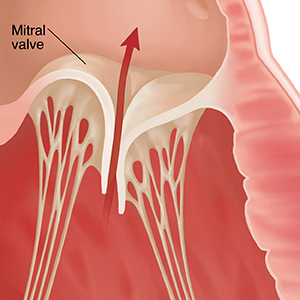Mitral valve regurgitation is when the mitral valve in the heart is leaky. This valve connects the left atrium to the left ventricle, the main pumping chamber of the heart. When the left ventricle contracts, blood is supposed to move forward out of the heart. With a leaky valve, some blood flows backwards. This reduces forward blood flow out of the heart. It’s also known as mitral insufficiency.
Types of treatment
Treatment will depend on the cause of your condition. It also depends on how severe it is and how quickly it developed.
If you have mild or moderate regurgitation, you may not need treatment. Your healthcare provider may just watch your health. You may need echocardiograms over time if you have moderate regurgitation. You may also need to take medicines such as:
-
Angiotensin-converting enzyme (ACE) inhibitors and beta-blockers to help reduce the workload of a heart that’s not pumping well
-
Medicines to slow the heart rate or control the heart rhythm if you develop atrial fibrillation (AFib)
-
Water pills (diuretics) to reduce swelling and improve symptoms
-
Blood-thinner medicine (anticoagulant) to help prevent blood clots if you have AFib
You may need surgery or a catheter-based procedure called a transcatheter mitral valve repair for severe regurgitation. Surgery is often needed right away for acute severe regurgitation. The surgeon or cardiologist may be able to repair the mitral valve. In some cases, the valve may need to be replaced.
Possible complications of mitral valve regurgitation
Mitral valve regurgitation can cause complications such as:
-
AFib, which increases the risk for stroke
-
High blood pressure in the lungs (pulmonary hypertension)
-
Dilation of the heart with weakening of the pumping chamber of the heart (ventricle)
-
Heart failure
To reduce the risk for these complications, your healthcare provider may prescribe:
-
Blood-thinner medicine to prevent blood clots
-
Medicine to reduce the stress load of the heart
-
Antibiotics before certain medical and dental procedures (this is if you have a history of congenital heart disease, a repaired or replaced heart valve, or a history of infection of the heart)
Living with mitral valve regurgitation
See your healthcare provider regularly. This is so they can watch your condition. Take note of any symptoms you feel. They may get worse during physical activity. Talk with your healthcare provider about what level of exercise is right for you. If you have mitral valve regurgitation that is getting worse, you may be advised to avoid certain activities. Tell all your healthcare providers and dentists about your valve problem.
If you have heart problems related to mitral valve regurgitation, your healthcare provider may also treat you with:
-
Medicines that lower blood pressure
-
Medicines to reduce the risk for arrhythmias
And your healthcare provider may also tell you to:
-
Eat a low-salt, heart-healthy diet to lower blood pressure and reduce the stress on your heart
-
Cut back on caffeine and alcohol to lower your risk for arrhythmias
When to call the healthcare provider
If you notice your symptoms are slowly getting worse, plan to see your healthcare provider. You may need surgery or a change of medicine.
Call 911
Call
-
Have severe shortness of breath or chest pain
-
Notice sudden new symptoms


